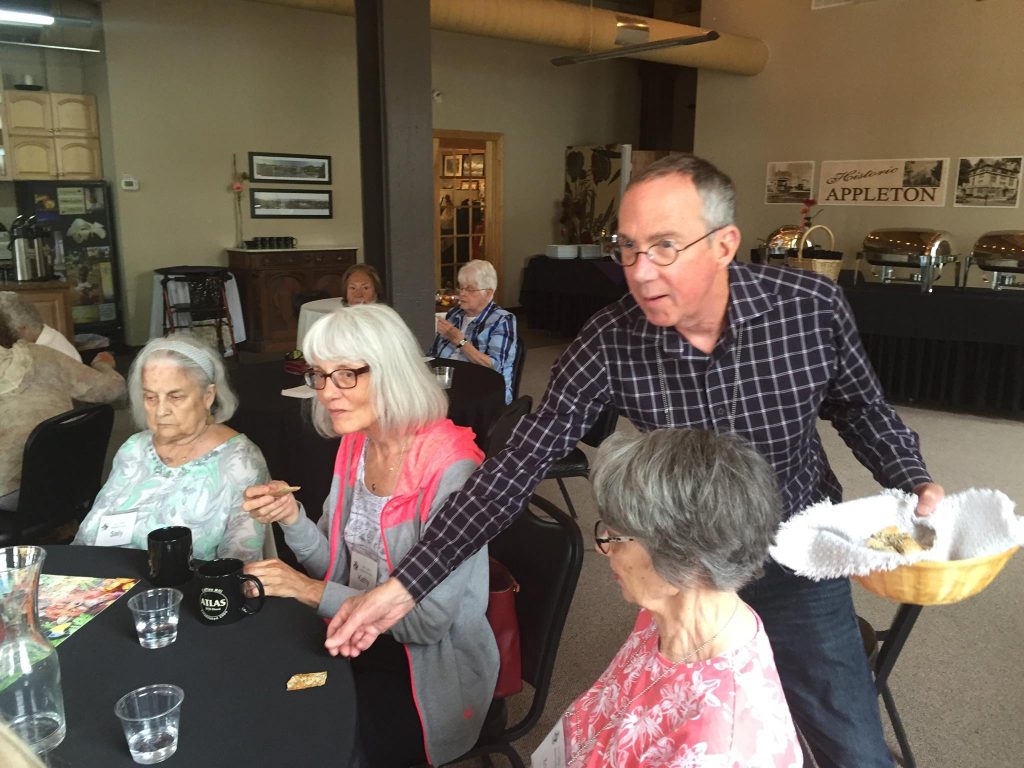As a Memory Care Chaplain, I see my role as providing comfort, meaning, dignity, worth, and—yes—fun to the lives of friends who are living with advanced dementia. Most of the conversations I participate in are decidedly non-linear but thoroughly enjoyable. It is a deeply spiritual role, but it requires a very broad understanding of what constitutes spirituality. It means affirming connection and relationality. It means helping persons to speak through the arts when they no longer have access to words. Sometimes it means offering prayer or sacred readings, and sometimes it means singing “She’ll be coming ‘round the mountain” while playing a ukulele. It means being present in love and joy.
Recently a resident asked me, “What do you do here?”
“I make mischief,” I answered. With a big grin she offered to help me. It is as good a job description as any.1-3
I am certified in TimeSlips creative story telling (www.timeslips.org), and take great pleasure in facilitating group interactions as we create a story together. But my TimeSlips training is also invaluable in my care for individuals, helping me to enter into the world of dementia in a creative, playful manner. My friend and I can go on an imaginative journey together, with neither of us knowing where it may lead but each finding pleasure and meaning in that journey. The pleasure of conversation with any friend lies not in the topics discussed, but in the manner in which we connect with one another, and therefore my conversations with my friends living with dementia bring me as much pleasure as any other.
Leading worship services for persons with advanced dementia has cured me of any lingering conceit that I was ever in control of a service: the worship goes where the Spirit and the participants wish to take it. But familiar texts and rituals are always included in the service, and that familiarity can bring comfort and a sense of calm. Largely aphasic persons can often say the 23rd psalm with me, and the old hymns reside in deep places dementia cannot reach. As I concluded one service, a woman who is wheelchair confined stood up and attempted to walk: something within her knew that it was time to go to coffee hour.
My role also requires me to be an advocate. For example, a resident was drawing very near to death with a primary diagnosis of Lewy Body Disease. Because of the very real risk of aspiration, the medical staff had ordered that she be given only thickened water to drink. She detested it. In a care conference with staff and family, I challenged the value of protecting her from aspiration while reducing her quality of life in her final weeks. I asked her family what she liked to drink.
“Diet Coke,” said her husband at once, “preferably with some Bacardi in it.” Orders were changed, and her smile when she took her first sip of Diet Coke in two weeks was, for me, a profoundly spiritual moment.
My friends with dementia often surprise me. Sometimes it is with a flash of unexpected wit; sometimes it is with a gentle, compassionate touch, revealing the full person who is still within. They are my mentors, teaching me that my value and worth lie not in my cognitive abilities, but in simply being a person cherished by God and sharing caring relationships with other people. My friends have also taught me a great deal about what it is to live fully in the present moment. I receive at least as much as I give.
Geriatric psychiatrist Abhilash Desai has observed that within advanced dementia “Cognitive function is severely weakened and yet, paradoxically or because of it, one often sees spirituality blossom” (personal communication). Among other expressions of this spiritually is the ability to live in the present moment, to show compassion for others, and to let go of the fear of death. He also notes (and I have observed) that they often enter into religious rituals that have long been a part of their lives in much deeper ways, especially those expressed through music. Those of us who are cognitively able are too often battling distraction or divided attention. My friends with advanced dementia are my mentors in important ways, helping me to understand the fullness of personhood—mine as well as theirs—in new and profound ways.
–John T. McFadden, M.Div.
John is retired as senior minister of First Congregational United Church of Christ (Appleton, WI) and now works part-time as Memory Care Chaplain at the Bridges of Appleton and at Valley VNA Senior Services.
References
- Morley, JE, Sanford, AM. The God card: Spirituality in the nursing home. JAMDA. 2014;15:533-535.
- Powers, BA, Watson, NM. Spiritual nurturance and support for nursing home residents with dementia. Dementia. 2011;10(1):59-80.
- McFadden, SH. Gathering and growing gifts through creative expression and playfulness. In Jewell, A (ed.), Spirituality and Personhood in Dementia (pp. 100-110). Philadelphia, PA: Jessica Kingsley Publishers.
